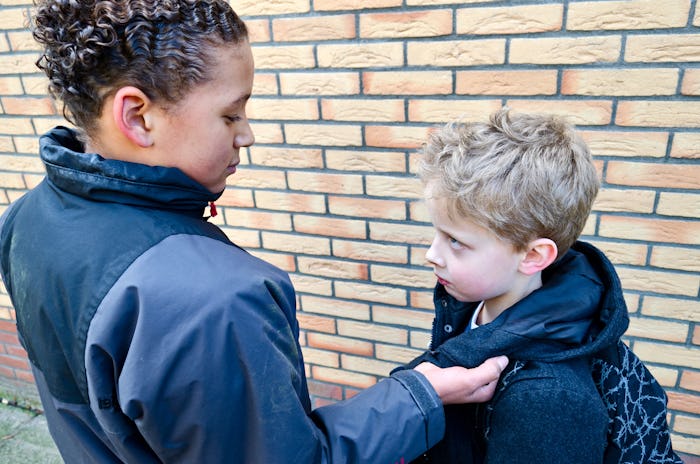Life

7 Subtle Signs Your Child Is A Bully
Most parents like to believe that their little one is a precious angel. And, similarly, more parents feel absolutely awful if they hear from a teacher, another parent, or family member that their child was hurtful towards a peer. It happens though. This doesn't make you or your child bad, but it does mean there is a situation which deserves attention. Whether this has caught you off guard or you've wondered about it in the back of your mind, there are actually some subtle signs your child is a bully. Regardless of how you decide to approach it, you can get some insight into your child's behavior just by picking up on a few observations.
Even if you and your child have had all the "right" talks about how to be a compassionate person, how to respect people's boundaries, and how to exhibit good listening skills, bullying can still occur. Most children, in my experience, they are simply reacting to a situation. It's deciphering the underlying issues that can be the difficult part of parenting.
Thankfully, there are plenty of ways you can decode your child's behavior to better understand what has led them to bullying and how you can work together to process the situation in a healthy way. Check out these subtle signs your child might be a bully.
1They're Good At Negotiating
When you think of a bully, you might picture someone who is loud and harsh, but that's not always the case. According to STOMP Out Bullying, a bully is, "good at talking their way of difficult and tense situations." So if you're baffled to hear your child has been bullying others, it may be because you always see them as smooth-talking charmers.
2It's Their Way Or The Highway
Plenty of kids get upset when they don't get what they want, but if that type of behavior is consistently causing problems at home and school, there may be more going on than you think. Dr. D. Janell Dietz, a therapist and author, told Everyday Health, that bullies become frustrated if they don't get their way. You may want to have a conversation with your child about how to be patient and cope with disappointment.
3They're Intolerant
In an interview with Care, a clinical psychologist Dr. Joel Haber said that your kid could be a bully if they seem intolerant of anything or anyone they deem to be weird, different, or unfamiliar. From freaking out when you give them a new vegetable to try at dinner to loudly commenting on someone who looks different in public, these could be indicators your child is or could be become a bully.
4They Inherit New Items At Random
Most parents are pretty observant, but it can be difficult to keep track of what makes its way in and out of your house. According to the government-funded website, Stop Bullying, "your child may be bullying others if they have unexplained extra money or new belongings." This implies that they threatened violence or forcibly took these items from another child.
5They Need To Be King Or Queen Bee
Though it's not unusual to want to be well-liked by peers, if that desire seems to be the driving force behind your child's behavior, they may be a bully. Dr. Robert Faris, a sociology professor at the University of California, told Business Insider that in his experience, an obsession with popularity, social status, and public perception can be the reason why a child displays bullying behavior. Especially in the social media age, it's important to talk to kids about the misleading portrayal of fame and popularity.
6They're Glued To Electronics
Kids these days get their hands on technology younger and younger, in my opinion, and that could spell danger. Dr. Gail Gross, a parenting and education expert, told The Huffington Post, that if your child insists on unmonitored time on the computer, their phone, or any other electronic device could mean that cyber bullying is happening right under your nose. Besides the issue of online predators, it's always a good idea to keep an eye on your child's online habits.
7They Lack Empathy
This might be an obvious one, but you might not truly realize the impact a lack of empathy can have. As STOMP Out Bullying noted, showing no sympathy for those who are bullied (whether in real life or on television), displaying little to no reaction in emotional situations, and being generally indifferent in situations that should elicit empathy are signs your child could be a bully or experiencing serious emotional and behavioral issues. As always, if you are concerned about your child's mental well-being, you can always talk to a medical professional for guidance.